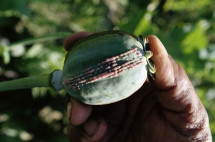From Golden Triangle to Rubber Belt?
In the Kokang and Wa regions in northern Burma opium bans have ended poppy cultivation, but have caused chronic poverty and food insecurity as a result.

In the Kokang and Wa regions in northern Burma opium bans have ended over a century of poppy cultivation. The bans have had dramatic consequences for local communities. They depended on opium as a cash crop, to buy food, clothing, and medicines.
The bans have driven poppy-growing communities into chronic poverty and have adversely affected their food security. Very few alternatives are being offered to households for their survival. The Kokang and Wa cease-fire groups have implemented these bans following international pressure, especially from neighbouring China. In return, they hope to gain international political recognition and aid to develop their impoverished and war-torn regions.
The Kokang and Wa authorities have been unable to provide alternative sources of income for ex-poppy farmers. Instead they have promoted Chinese investment in monoplantations, especially in rubber. These projects have created many undesired effects and do not significantly profit the population.
Conclusions & Recommendations
• The opium bans have driven communities into chronic poverty and have adversely affected their food security and access to health care and education.
• The Kokang and Wa authorities have promoted Chinese investment in mono-plantations, especially in rubber. These projects are unsustainable and do not significantly profit the population.
• Ex-poppy farmers mainly rely on casual labour and collecting Non-Timber Forest Products as alternative source of income.
• Current interventions by international NGOs and UN agencies are still limited in scale and can best be described as “emergency responses”.
• If the many challenges to achieving viable legal livelihoods in the Kokang and Wa regions are not addressed, the reductions in opium cultivation are unlikely to be sustainable.
Pages: 12